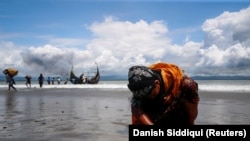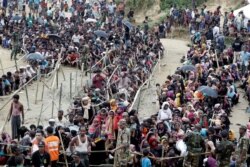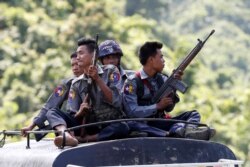Myanmar is on the agenda of the United Nations Human Rights Council’s 50th regular session to be held in Geneva, Switzerland from June 13 to July 8.
One of the session’s panels is on “the root causes of human rights violations and abuses against Rohingya Muslims and other minorities in Myanmar.”
In a statement, outgoing U.N. human rights chief Michele Bachelet said:
“This August, we will pass the fifth anniversary of the widespread and systematic campaign of violence by the Myanmar military that has driven more than one million Rohingya Muslims from their homes in Rakhine State in Myanmar, to seek refuge in neighboring Bangladesh.”
Bachelet noted that for more than half a century, Myanmar’s authorities had engaged in a campaign of “discrimination and exclusion against ethnic and religious minority groups,” leaving a long record of human rights abuses.
But Myanmar’s diplomatic mission in Geneva fired back, claiming the U.N. council had not addressed “the root cause of the issue impartially.”
“Terrorism was the main cause of the outbreak of violence in Rakhine in 2016 and 2017,” the mission stated.
That is misleading.
While Rohingya militant attacks in 2016 and 2017 did occur, they emerged only after decades of violent state repression.
Moreover, the Myanmar government’s military crackdown and resulting mass refugee crisis has been called a genocide by the United States and others. Bachelet's predecessor called it “a textbook example of ethnic cleansing.”
The Rohingya are a Muslim minority who were concentrated in Myanmar’s western Rakhine state prior to the mass expulsions to neighboring Bangladesh in 2016-2017. They view themselves as indigenous to western Myanmar.
Myanmar’s government argues there is no such group as the Rohingya, claiming they are colonial and post-colonial migrants from Bangladesh.
That claim has served as a pretext for rampant discrimination and persecution.
In October 2015, researchers from the International State Crime Initiative (ISCI), at Queen Mary University of London (QMUL), “found compelling evidence that the Rohingya face mass annihilation and are in the final stages of a genocidal process.”
The ISCI report, backed by government documents, stated:
“ISCI’s detailed research found ample evidence that the Rohingya have been subjected to systematic and widespread violations of human rights, including killings, torture, rape and arbitrary detention; destruction of their homes and villages; land confiscation; forced labor; denial of citizenship; denial of the right to identify themselves as Rohingya; denial of access to healthcare, education and employment; restrictions on freedom of movement, and State-sanctioned campaigns of religious hatred.”
What the ISCI calls the “longer-term strategy” by the Myanmar state to “isolate, weaken, and eliminate” the Rohingya can in part be traced back to The Burma Citizenship Act of 1982. The act provided citizenship to individuals who could prove they had family ties in Burma prior to 1823.
The United Nations Refugee agency said the act made the Rohingya “the world’s largest stateless population,” denied them basic rights and protections, and left them open to abuse and exploitation.
“Our citizenship has been stolen from us. Rohingya statelessness is not an accident of history; it was deliberately produced by the Myanmar military as a part of the ongoing genocide,” prominent Rohingya political activist Nay San Lwin said in March of 2021.
The Arakan Rohingya Salvation Army (ARSA), the Rohingya insurgent group behind the 2016 and 2017 attacks, said restoration of citizenship was a condition of ending armed resistance.
Violence by governmental authorities in Myanmar against the Rohingya dramatically flared up in 1978, 1991, 2012 and 2016. Each time, hundreds of thousands of Rohingya were driven out of the country.
An ARSA representative told the Asia Times the militant group began operating in Rakhine state in 2013, after a wave of communal violence in 2012 “left scores dead and 130,000 Rohingya confined to squalid camps for the internally displaced.”
“ARSA was a direct consequence of events in 2012,” he said.
Human Rights Watch reported in April 2013 that what began “as sectarian clashes in four townships” in early June 2012 mutated into a “coordinated campaign to forcibly relocate or remove the state’s Muslims.”
Isolated cases of violence against Rohingya persisted in 2013-2015.
Poverty in Rakhine state is extreme, with a lack of basic sanitation, drinking water and electricity that was worse “than in any other state in Myanmar,” said the World Bank.
Poverty has played a central role in the ethnic and religious tension between the Rohingya and the Rakhine, one of the four main Buddhist ethnic groups of Myanmar. The Rakhine people make up a majority in Rakhine state.
A U.S. State Department Atrocities Prevention report released in March 2016 described the “grim situation” in Rakhine State, with Rohingya and Rakhine communities suffering “long-standing marginalization” at the hands of the state.
“The lack of investment by the central government has resulted in poor infrastructure and inferior social services, while lack of rule of law has led to inadequate security conditions,” the report found.
During times of ethnic strife, state security forces have been accused of both failing to stop violence against the Rohingya or actively participating in it.
In August 2017, attacks by the ARSA on 30 police posts and an army base, which left 12 members of Myanmar’s security forces dead. A similar attack in October 2016 had killed 9 police officers.
The ARSA’s leaders deny being a terrorist group, saying they only target security forces. But the ARSA has been accused of killing informers, the BBC reported.
Still, the weight of the violence tilts heavily toward Myanmar.
An August 2018 survey released by the U.S. Department of State found that the Myanmar military “used the ARSA attacks to justify its so-called counterinsurgency operations in northern Rakhine State, targeted civilians indiscriminately and often with extreme brutality.”
The survey found that violence in northern Rakhine state “was extreme, large-scale, widespread, and seemingly geared toward both terrorizing the population and driving out the Rohingya residents.”
“The scope and scale of the military’s operations indicate they were well-planned and coordinated,” it stated. “In some areas, perpetrators used tactics that resulted in mass casualties, for example, locking people in houses to burn them, fencing off entire villages before shooting into the crowd, or sinking boats full of hundreds of fleeing Rohingya.”
A February 2017 U.N. report said that “devastating cruelty” had been used against the Rohingya population in Rakhine province.
The U.N. refugee agency estimates more than 980,000 refugees and asylum-seekers from Myanmar are living in neighboring states.
The Myanmar government’s response to the August 2017 attacks forced more than 742,000 Rohingya to move to Bangladesh. Nearly half were children.







